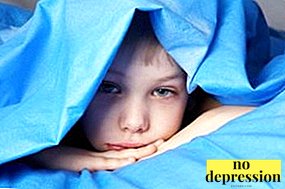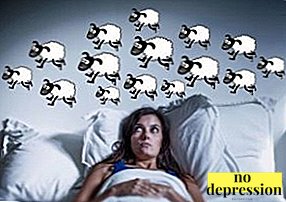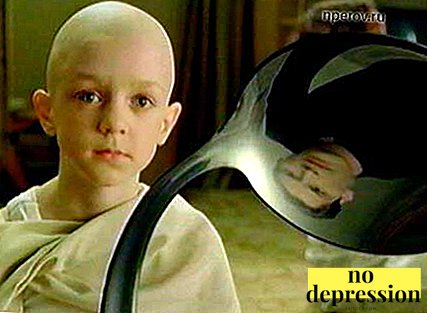Various sleep disorders, which are popularly called insomniais called dissomnia. What it is? This is not just an inability to fall asleep at night.
Dysomnia disturbs the depth, duration of sleep, shifts the time of falling asleep and awakening. Pathology occurs both in children and adults.
Concept and causes

From a medical point of view, dissomnia is any sleep disturbance, its duration, depth and rhythm.
According to ICD 10, the disease is code G47.
For a person’s sleep, there’s a part of the brain called hypothalamus. Nerve cells in it are responsible for the production of biologically active substances responsible for falling asleep.
This substance is serotonin. Its insufficient production provokes insomnia. Also in the brain there is a reticular area responsible for awakening.
When the awakening area dominates the sleep area, sleep disturbance occurs.
The causes of dissomnii are still not precisely defined. However, some provoking factorsthat can cause a persistent sleep disorder. In adults, it is:
- Emotional stress situations.
- Somatic diseases.
- Short shocks.
- Chronic heart disease, kidney.
- Change time zone.
- Mental illness.
- Neurosis.
- Infections.
- Taking certain medications (antidepressants, stimulants, nootropics, corticosteroids).
 Prolonged physical and mental stress.
Prolonged physical and mental stress.- Eating disorders (eating at night).
In children, sleep disorders are associated with:
- hyperactivity;
- stresses;
- difficulties of social adaptation (transition to another class);
- emotional turmoil;
- epilepsy;
- increased excitability;
- infectious diseases.
Not only negative, but also positive emotions can disturb sleep: love, joy from success at work, etc.
Doctor Komarovsky will tell you what conditions should be created during the day so that the baby sleeps well at night:
Relationship with anxiety-depressive episode

The emergence of dyssomnia on the background of anxious depressive episode quite natural.
Anxiety-depressive syndrome is the scourge of modern society.
The disorder begins in adolescence. Children too sensitive to criticism and comments. Hard to fail. Subsequently, this leads to the development of various phobias and fears.
In adulthood, these manifestations may increase, given the frantic pace of modern life and being in constant stress.
People are plagued by anxiety, fear of losing their job, or falling below the poverty line. Also strong experiences appear as a result of problems in his personal life.
If a person is constantly or very often in a state of stress and anxiety, then he will experience irregularities in the work of all body systems.
In the brain, responsible for sleep, it becomes predominant excitation region. As a result, dissomnia occurs.
Classification of pathology
The classification of the disease is based on the duration of the course. Stand out:
- Episodic. It lasts no more than a week and occurs against the background of short-term stressful situations (conflicts, diseases, belt changes, medication).
 Short term. It lasts from one to three weeks. It occurs against the background of a more prolonged impact of adverse factors: the loss of loved ones, a change of work, a long illness, a stressful prolonged situation.
Short term. It lasts from one to three weeks. It occurs against the background of a more prolonged impact of adverse factors: the loss of loved ones, a change of work, a long illness, a stressful prolonged situation.- Chronic. Lasts more than a month. Occurs due to psychosomatic diseases, prolonged stressful situations. The disease occurs in the presence of alcohol and drugs, tranquilizers, hormonal drugs.
Depending on the type of sleep disorders, stand out:
- Insomnia. Reducing the duration of sleep and disturbed sleep.
- Hypersomnia. Increased sleep period.
- Parasomnia. This is a sleep disorder. For example, sleepwalking, bruxism, nightmares.
- Violation of the “sleep-wake” cycle with daytime sleep shift.
The appearance of insomnia enhances and contributes to the emergence of new neuropsychiatric disorders.
Insomnia. How to learn to sleep? Causes of Insomnia. The psychotherapist will tell in this video:
Symptoms and diagnosis

If a person sometimes does not sleep well or often wakes up at night, this does not mean that he has dissomnia.
There are a few signs, which can be suspected sleep disorder:
- The inability to sleep for a long time, despite all the measures taken: darkness, silence, evening walks. A person falls asleep already in the morning and sleeps only 2-3 hours.
- Constant awakening in the middle of the night and superficial sleep in the following hours.
- Good long sleep, lasting more than 10 hours, having a regular character.
- Poor sleep at night and constant daytime sleepiness.
- Superficial nature of night sleep. A person slumbers and is aware of everything that happens around.
- Intermittent sleep. Constant waking up several times a night.
The diagnosis of "sleep disturbance" is made by a neurologist and somnolog. The latter specializes in various sleep disorders and can accurately determine the nature of the disorder.
For the diagnosis method is used polysomnography.
This study of the functioning of the body during sleep to determine the cause of the disorder. The study is painless and has no contraindications.
His conduct adults, children, pregnant. The only obstacle to polysomnography are infectious diseases or chronic diseases in the acute stage. They may affect the accuracy of the results.

The essence of the method consists in superimposing various sensors on the human body, which record the work of the brain, heart, lungs in a dream.
Data is sent to the computer. Also in the room set the video camera, which monitors the patient's behavior.
Using this method are fixed:
- sleep apnea (apnea);
- pressure surges;
- muscle spasms;
- disruption of the supply of organs with oxygen;
- malfunctions of the brain (the duration of the phase of sleep and awakening);
- various movements of limbs in a dream;
- walking in a dream (sleepwalking, somnambulism).
Based on research data, the doctor makes a diagnosis and is determined with treatment tactics.
Treatment of the disease
Treats sleep disorders neurologist. If serious mental disorders are detected, the help of a psychotherapist or psychiatrist is required.
To restore sleep, they make adjustments to the daily pattern and nutrition. At bedtime, short walks are recommended. You can not do any work.
It is necessary to completely abandon food intake and tea consumption. Coffee and other energy drinks are allowed only in the morning in a small amount.

The doctor writes out light sedatives. Melatonin-based drugs help me sleep: Melaxen, Cirkadin.
They help improve sleep, physiotherapy, acupuncture, massage.
Herbal medicine is also used. Psychotherapy sessions help get rid of anxiety, fear, stress and restore sleep.
Sleeping pills are prescribed by a doctor only in case of persistent violation of sleep and a decrease in the duration of sleep. Long-term use is contraindicated, as it can be addictive.
Dissomnia in the modern world is becoming more common. She is provoked long and frequent stress situations.
It is important to diagnose pathology in time and begin treatment so as not to provoke the development of a neuropsychiatric disorder.
ABOUT folk remedies for insomnia treatment you can learn from this video:

 Prolonged physical and mental stress.
Prolonged physical and mental stress. Short term. It lasts from one to three weeks. It occurs against the background of a more prolonged impact of adverse factors: the loss of loved ones, a change of work, a long illness, a stressful prolonged situation.
Short term. It lasts from one to three weeks. It occurs against the background of a more prolonged impact of adverse factors: the loss of loved ones, a change of work, a long illness, a stressful prolonged situation.

